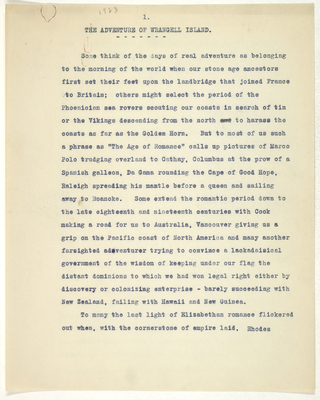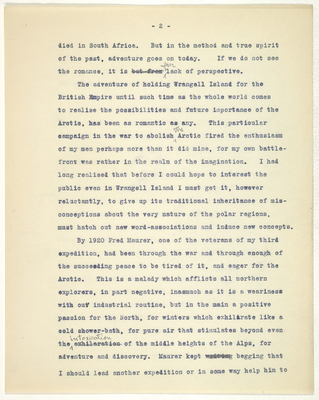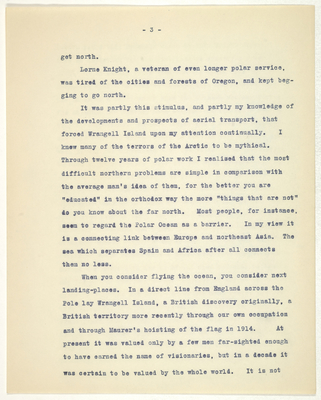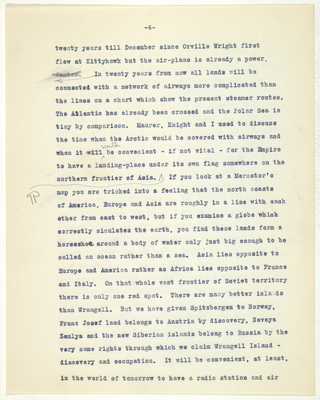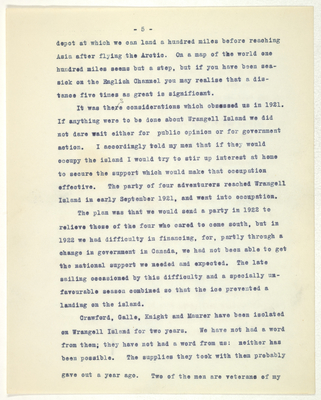Pages
stefansson-wrangel-09-24-002-001
1923
1.
THE ADVENTURE OF WRANGELL ISLAND. - - - - - - -
Some think of the days of real adventure as belonging to the morning of the world when our stone age ancestors first set thir feet upon the landbridge that joined France to Britain; others might select the period of the Phoenician sea rovers scouting our coasts in search of tin or the Vikings descending from the north and to harass the coasts as far as the Golden Horn. But to most of us such a phrase as "The Age of Romance" calls up pictures of Marco Polo trudging overland to Cathay, Columbus at the prow of a Spanish galleon, Da Gama rounding the Cape of Good Hope, Raleigh spreading his mantle before a queen and sailing away to Roanoke. Some extend the romantic period down to the late eighteenth and nineteenth centuries with Cook making a road for us to Australia, Vancouver giving us a grip on the Pacific coast of North America and many another farsighted adsventurer trying to convince a lackadaisical government of the wisdom of keeping under our flag the distant dominions to which we had won legal right either by discovery or colonizing enterprise - barely succeeding with New Zealand, failing with Hawaii and New Guinea.
To many the last light of Elizabethan romance flickered out when, with the cornerstone of empire laid, Rhodes
stefansson-wrangel-09-24-002-002
- 2 -
died in South Africa. But in the method and true spirit of the past, adventure goes on today. If we do not see the romance, it is but from for lack of perspective.
The adventure of holding Wrangell Island for the British Empire until such time as the whole world comes to realise the possibilities and future importance of the Arctic, has been as romantic as any. This particular campaign in the war to abolish the Arctic fired the enthusiasm of my men perhaps more than it did mine, for my own battlefront was rather in the realm of the imagination. I had long realised that before I could hope to interest the public even in Wrangell Island I must get it, however reluctantly, to give up its traditional inheritance of misconceptions about the very nature of the polar regions, must hatch out new word-associations and induce new concepts.
By 1920 Fred Maurer, one of the veterans of my third expedition, had been through the war and through enough of the succeeding peace to be tired of it, and eager for the Arctic. This is a malady which afflicts all northern explorers, in part negative, inasmuch as it is a weariness with our industrial routine, but in the main a positive passion for the North, for winters which exhilarate like a cold shower-bath, for pure air that stimulates beyond even the intoxication exhilaration of the middle heights of the Alps, for adventure and discovery. Maurer kept writing begging that I should lead another expedition or in some way help him to
stefansson-wrangel-09-24-002-003
- 3 -
get north.
Lorne Knight, a veteran of even longer polar service, was tired of the cities and forests of Oregon, and kept begging to go north.
It was partly this stimulus, and partly my knowledge of the developments and prospects of aerial transport, that forced Wrangell Island upon my attention continually. I knew many of the terrors of the Arctic to be mythical. Through twelve years of polar work I realised that the most difficult northern problems are simple in comparison with the average man’s idea of them, for the better you are "educated” in the orthodox way the more "things that are not" do you know about the far north. Most people, for instance, seem to regard the Polar Ocean as a barrier. In my view it is a connecting link between Europe and northeast Asia. The sea which separates Spain and Africa after all connects them no less.
When you consider flying the ocean, you consider next landing-places. In a direct line from England across the Pole lay Wrangell Island, a British discovery originally, a British territory more recently through our own occupation and through Maurer's hoisting of the flag in 1914. At present it was valued only by a few men far-sighted enough to have earned the name of visionaries, but in a decade it was certain to be valued by the whole world. It is not
stefansson-wrangel-09-24-002-004
-4-
twenty years till December since Orville Wright first flew at Kittyhawk but the air-plane is already a power. factor In twenty years from now all lands will be connected with a network of airways more complicated than the lines on a chart which show the present steamer routes. The Atlantic has already been crossed and the Polar Sea is tiny by comparison. Maurer, Knight and I used to discuss the time when the Arctic would he covered with airways and when it will would be convenient - if not vital - for the Empire to have a landing-place under its own flag somewhere on the northern frontier of Asia. [Paragraph symbol]If you look at a Mercator’s map you are tricked into a feeling that the north coasts of America, Europe and Asia are roughly in a line with each other from east to west, but if you examine a globe which correctly simulates the earth, you find these lands form a horseshoe around a body of water only just big enough to be called an ocean rather than a sea. Asia lies opposite to Europe and America rather as Africa lies opposite to France and Italy. On that whole vast frontier of Soviet territory there is only one red spot. There are many better islands than Wrangell. But we have given Spitzbergen to Norway, Franz Josef land belongs to Austria by discovery, Novaya Zemlya and the new Siberian islands belong to Russia by the very same rights through which we claim Wrangell Island - discovery and occupation. It will be convenient, at least, in the world of tomorrow to have a radio station and air
stefansson-wrangel-09-24-002-005
- 5 -
depot at which we can land a hundred miles before reaching Asia after flying the Arctic. On a map of the world one hundred miles seems but a step, but if you have been seasick on the English Channel you may realise that a distance five times as great is significant.
It was these considerations which obsessed us in 1921. If anything were to be done about Wrangell Island we did not dare wait either for public opinion or for government action. I accordingly told my men that if they would occupy the island I would try to stir up interest at home to secure the support which would make that occupation effective. The party of four adventurers reached Wrangell Island in early September 1921, and went into occupation.
The plan was that we would send a party in 1922 to relieve those of the four who cared to come south, but in 1922 we had difficulty in financing, for, partly through a change in government in Canada, we had not been able to get the national support we needed and expected. The late sailing occasioned by this difficulty and a specially unfavourable season combined so that the ice prevented a landing on the island.
Crawford, Galle, Knight and Maurer have been isolated on Wrangell Island for two years. We have not had a word from them; they have not had a word from us: neither has been possible. The supplies they took with them probably gave out a year ago. Two of the men are veterans of my
